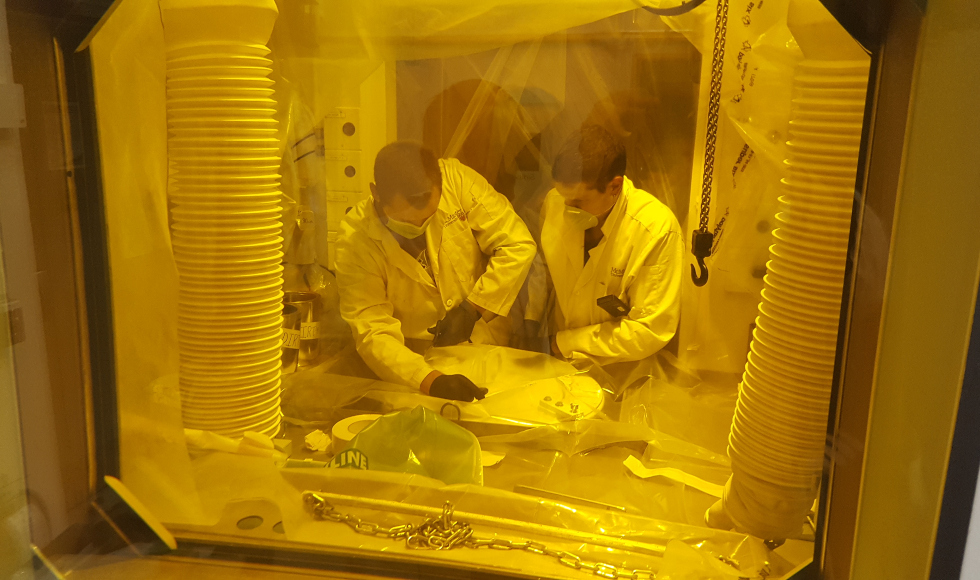New partnership focuses on life cycle management of Ontario’s power reactors

McMaster nuclear technicians prepare the receiving cell at the Centre for Advanced Nuclear Systems for the arrival of a pressure tube.
BY Lori Dillon
November 4, 2020
McMaster University and Kinectrics Inc. – a life-cycle management company for the electricity industry – have completed the first phase of an on-going partnership focused on surveillance monitoring of components from Ontario Power Generation’s Darlington Nuclear Generating Station.
The outcome of their work ensures that equipment used during maintenance will perform to the industry’s exacting standards and provides the requisite data for decision-making on infrastructure renewal.
Chris Heysel, Director of McMaster’s Nuclear Operations & Facilities, calls the initiative a “real milestone” for the university.
“This is the first project of its kind and to realize just how this partnership will positively impact the clean energy sector here in Ontario really demonstrates the power and value of collaboration,” he says, noting that McMaster is the only university in the world capable of undertaking this kind of project.
The work is being conducted at McMaster’s Centre for Advanced Nuclear Systems (CANS) – a unique regional research facility dedicated to the study of nuclear systems; created under the leadership of John Luxat, professor of engineering physics and NSERC/UNENE Senior Industrial Research Chair.
“From the outset, the team of researchers behind CANS envisioned a facility that would support the nuclear sector, particularly Ontario’s three nuclear power plants,” says Luxat.
“To see this in action – providing the infrastructure that allows industry to better understand the lifespan of nuclear components and how material properties change when subjected to the conditions in an operating nuclear power plant – is a great source of pride and a testament to our relevance to the industry.”
The first stage of the project began a month ago when a large lead drum – about the size of a washing machine – arrived at CANS and McMaster’s highly trained experts remotely opened the drum to access its contents: a piece of pressure tube that is used to hold nuclear fuel.
Pressure tubes are unique features of the Canadian designed CANDU reactor. There are 480 of these six-metre long tubes in a typical reactor which are used to hold fuel bundles in place while at the same time provide cooling to the fuel.
Using state-of-the-art engineering equipment, a section of the radioactive metal tube was precisely machined to the required exacting dimensions – to within the width of a human hair – and transferred into a larger workspace, where experts from Kinectrics took over.
Specifically, nuclear technicians used Kinectrics’ CWEST* (Circumferential Wet Scrape Tool) to remotely take multiple samples from a pressure tube inside a reactor core, while Kinectrics staff simulated the conditions found in the field and tested the improved tool to ensure it would perform as required when deployed during a maintenance outage. (*Not available for sale outside of Canada until after November 30, 2027.)
The CWEST tool allows for remote pressure tube sampling of CANDU reactors from robotic delivery systems and saves significant outage time and dose for the utilities. It’s now been used in over 25 outages.
“The data that we get from these analyses is critical to life cycle management at Ontario’s power reactors,” says David Harris, CEO of Kinectrics.
“As a leader in the field, Kinectrics plays a key role in surveillance testing of pressure tubes at Canada’s nuclear power reactors. Being able to simulate real-life conditions at McMaster, in proximity to our analytical facilities, enables us to confidently prove tool improvements in response to the customer’s needs.”
Both McMaster and Kinectrics are partners of OPG’s newly launched Centre for Canadian Nuclear Sustainability, designed to advance nuclear innovation, collaboration and research.
“This partnership demonstrates the type of activity the CCNS will foster,” said Sabrina Nestor, Manager of Innovation and Decommissioning Strategy at the Centre. “Bringing industry experts together to identify innovative opportunities in the nuclear lifecycle will support nuclear sustainability.”
Karen Mossman, McMaster’s vice-president, research says these kinds of collaborative research projects are an integral part of the university’s research enterprise.
“We’re recognized as a world leader in nuclear research, training and safety, and it’s so important that we work with our industry partners – pooling our knowledge and expertise – to capitalize on our collective strengths to advance the sector.”


